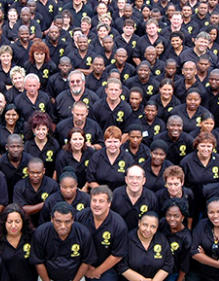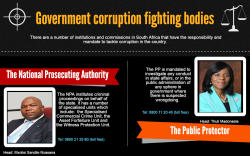|
Getting your Trinity Audio player ready...
|
 In parts one and two of our series we focused on international, regional and domestic legislation that assists the country in the fight against corruption. But South African corruption fighters don’t just have clear-cut pieces of legislation on their side. There are a number of institutions and commissions whose specific task is to root out, tackle and eliminate all forms of corruption.
In parts one and two of our series we focused on international, regional and domestic legislation that assists the country in the fight against corruption. But South African corruption fighters don’t just have clear-cut pieces of legislation on their side. There are a number of institutions and commissions whose specific task is to root out, tackle and eliminate all forms of corruption.
In our third article, we take a look at those organisations.
The National Prosecuting Authority
The National Prosecuting Authority (NPA) institutes criminal proceedings on behalf of the state. It is headed by the national director of public prosecutions, who is currently Mxolisi Nxasana. He is supported by a CEO and four deputy national directors.
The NPA has a number of specialised units, including the Specialised Commercial Crime Unit; the Asset Forfeiture Unit and the Witness Protection Unit.
All NPA employees are governed by the NPA’s code of ethics, which incorporates the NPA’s whistle-blowing policy.
The public protector
The public protector is mandated to investigate any conduct in state affairs, or in the public administration of any sphere of government where there is suspected impropriety. The Public Protector reports on such conduct and is empowered to take appropriate remedial action.
The public protector is Advocate Thuli Madonsela, and she is assisted by her deputy, Advocate Kevin Malunga and the CEO, Themba Mthethwa.
The Directorate for Priority Crime Investigation
The Directorate for Priority Crime Investigation (DCPI) – also known as the Hawks – is an independent directorate within the South African Police Service (SAPS) that manages, prevents, investigates and combats serious organised crime, serious corruption and serious commercial crime.
It’s currently headed by General Anwar Dramat.
The Asset Forfeiture Unit is a unit within the office of the national director of public prosecutions. It was established in order to implement chapters five and six of the Prevention of Organised Crime Act, which allow for the seizure of assets used in criminal activities.
The unit is currently headed by attorney Willie Hofmeyr, formerly the head of the Special Investigating Unit.
The Special Investigating Unit
The Special Investigating Unit (SIU) is a state body that fights corruption through quality investigations and litigation. The SIU is an independent statutory body that was established by the president. It conducts investigations and reports the outcomes of its investigations to the president.
The head of the SIU is Advocate Vasantrai Soni.
The Financial Intelligence Centre
The Financial Intelligence Centre is established in terms of the Financial Intelligence Centre Act (Fica). The centre receives reports of suspicious financial transactions. It aims to combat money laundering in South Africa, and, through Fica, break the cycle used by organised criminal groups to benefit from illegitimate profits. By doing this, it aims to maintain the integrity of the country’s financial system.
The director of the centre is Murray Michell, who was also appointed in July as the new chairperson of the Egmont Group of financial intelligence units.
The auditor-general
The auditor-general has a mandate in terms of the Constitution to audit and report on accounts, financial statements and the financial management of all national and provincial departments, municipalities and any other institution required by legislation to be audited.
The auditor-general is the supreme audit institution in South Africa; it exists to strengthen our country’s democracy by enabling oversight, accountability and governance in the public sector through auditing, thereby building public confidence.
The outgoing auditor-general is Terence Nombembe, who has served his seven-year term with diligence and, according to regulations, may not be re-appointed. He is succeeded by his deputy Kimi Makwetu, who takes up his new role on 1 December 2013.
The Public Service Commission:
The Public Service Commission (PSC) was established in terms of Section 196 of the Constitution. The PSC is an independent, impartial body that seeks to enhance governance in the public service. It’s regulated by the Public Service Commission Act 46 of 1997.
The powers and functions of the PSC include investigating and monitoring the organisation and administration of the public service. The commission is mandated by Cabinet to manage the national anti-corruption hotline, another channel for people to report corruption. Cases are then referred to departments and agencies for investigation and are required to provide feedback to the PSC.
The chairperson of the PSC is Ben Mthembu and he is assisted by his deputy Phelele Tengeni.
Independent Police Investigative Directorate
Formerly known as the Independent Complaints Directorate, the Independent Police Investigative Directorate (Ipid) aims to ensure independent oversight of the SAPS. It conducts independent investigations of criminal offences allegedly committed by SAPS members. This includes investigations of individual acts of corruption as well as systemic corruption involving the police. The Ipid was established in 1997, in terms of the Ipid Act. Its vision is to ensure the proper police conduct in line with the Constitution.
Ipid is currently without an official executive director, but is headed by acting director Koekie Mbeki.





